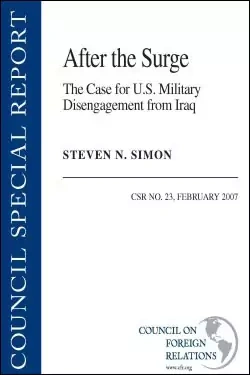
After the Surge
The Case for U.S. Military Disengagement from Iraq

- Council Special Report
- Concise policy briefs that provide timely responses to developing crises or contributions to current policy dilemmas.
Overview
Iraq has come to dominate U.S. foreign policy—and the controversy over Iraq has come to dominate the debate over U.S. foreign policy.
This report by Steven N. Simon, the Hasib J. Sabbagh Senior Fellow for Middle Eastern Studies at the Council on Foreign Relations, makes a major contribution to that debate.
More on:
After the Surge: The Case for U.S. Military Disengagement from Iraq is premised on the judgment that the United States is not succeeding in Iraq and that Iraq itself is more divided and violent than ever. It concludes that the administration’s decision to increase U.S. force levels will fail to prevent further deterioration in the situation—and that there is no alternative policy with the potential to turn things around.
As a result, Simon urges the United States to disengage militarily from Iraq, a disengagement that in his view should involve a negotiated accord with Iraq’s government, a dialogue with Iraq’s neighbors, and new diplomatic initiatives throughout the region. Simon argues that if the United States does all this, it can minimize the strategic costs of its failure in Iraq and even offset these losses in whole or in part.
More on:
 Online Store
Online Store
